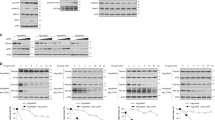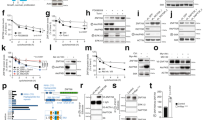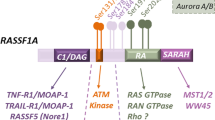Abstract
The tumor suppressor RASSF1A is inactivated in many human cancers and is implicated in regulation of microtubule stability, cell cycle progression and apoptosis. However, the precise mechanisms of RASSF1A action and their regulation remain unclear. Here we show that Skp2, an oncogenic subunit of the Skp1–Cul1–F–box ubiquitin ligase complex, interacts with, ubiquitinates, and promotes the degradation of RASSF1A at the G1–S transition of the cell cycle. This Skp2-dependent destruction of RASSF1A requires phosphorylation of the latter on serine-203 by cyclin D–cyclin-dependent kinase 4. Interestingly, mutation of RASSF1A-phosphorylation site Ser203 to alanine results in a delay in cell cycle progression from G1 to S phase. Moreover, enforced expression of Skp2 abolishes the inhibitory effect of RASSF1A on cell proliferation. Finally, the delay in G1–S progression after Skp2 removal is normalized by depletion of RASSF1A. These findings suggest that the Skp2-mediated degradation of RASSF1A plays an important role in cell proliferation and survival.
This is a preview of subscription content, access via your institution
Access options
Subscribe to this journal
Receive 50 print issues and online access
$259.00 per year
only $5.18 per issue
Buy this article
- Purchase on Springer Link
- Instant access to full article PDF
Prices may be subject to local taxes which are calculated during checkout






Similar content being viewed by others
References
Agathanggelou A, Cooper WN, Latif F . (2005). Role of the Ras-association domain family 1 tumor suppressor gene in human cancers. Cancer Res 65: 3497–3508.
An HX, Beckmann MW, Reifenberger G, Bender HG, Niederacher D . (1999). Gene amplification and overexpression of CDK4 in sporadic breast carcinomas is associated with high tumor cell proliferation. Am J Pathol 154: 113–118.
Baksh S, Tommasi S, Fenton S, Yu VC, Martins LM, Pfeifer GP et al. (2005). The tumor suppressor RASSF1A and MAP-1 link death receptor signaling to Bax conformational change and cell death. Mol Cell 18: 637–650.
Bartkova J, Lukas J, Strauss M, Bartek J . (1995). Cyclin D1 oncoprotein aberrantly accumulates in malignancies of diverse histogenesis. Oncogene 10: 775–778.
Bashir T, Pagano M . (2003). Aberrant ubiquitin-mediated proteolysis of cell cycle regulatory proteins and oncogenesis. Adv Cancer Res 88: 101–144.
Bashir T, Dorrello NV, Amador V, Guardavaccaro D, Pagano M . (2004). Control of the SCF(Skp2-Cks1) ubiquitin ligase by the APC/C(Cdh1) ubiquitin ligase. Nature 428: 190–193.
Cardozo T, Pagano M . (2004). The SCF ubiquitin ligase: insights into a molecular machine. Nat Rev Mol Cell Biol 5: 739–751.
Carrano AC, Eytan E, Hershko A, Pagano M . (1999). SKP2 is required for ubiquitin-mediated degradation of the CDK inhibitor p27. Nat Cell Biol 1: 193–199.
Dammann R, Li C, Yoon JH, Chin PL, Bates S, Pfeifer GP . (2000). Epigenetic inactivation of a RAS association domain family protein from the lung tumour suppressor locus 3p21.3. Nat Genet 25: 315–319.
Fenton SL, Dallol A, Agathanggelou A, Hesson L, Ahmed-Choudhury J, Baksh S et al. (2004). Identification of the E1A-regulated transcription factor p120 E4F as an interacting partner of the RASSF1A candidate tumor suppressor gene. Cancer Res 64: 102–107.
Gstaiger M, Jordan R, Lim M, Catzavelos C, Mestan J, Slingerland J et al. (2001). Skp2 is oncogenic and overexpressed in human cancers. Proc Natl Acad Sci USA 98: 5043–5048.
Harper JW . (2002). A phosphorylation-driven ubiquitination switch for cell-cycle control. Trends Cell Biol 12: 104–107.
Huang H, Regan KM, Wang F, Wang D, Smith DI, van Deursen JM et al. (2005). Skp2 inhibits FOXO1 in tumor suppression through ubiquitin-mediated degradation. Proc Natl Acad Sci USA 102: 1649–1654.
Latres E, Chiarle R, Schulman BA, Pavletich NP, Pellicer A, Inghirami G et al. (2001). Role of the F-box protein Skp2 in lymphomagenesis. Proc Natl Acad Sci USA 98: 2515–2520.
Lim DS, Kim ST, Xu B, Maser RS, Lin J, Petrini JH et al. (2000). ATM phosphorylates p95/nbs1 in an S-phase checkpoint pathway. Nature 404: 613–617.
Marti A, Wirbelauer C, Scheffner M, Krek W . (1999). Interaction between ubiquitin-protein ligase SCFSKP2 and E2F-1 underlies the regulation of E2F-1 degradation. Nat Cell Biol 1: 14–19.
Matallanas D, Romano D, Yee K, Meissl K, Kucerova L, Piazzolla D et al. (2007). RASSF1A elicits apoptosis through an MST2 pathway directing proapoptotic transcription by the p73 tumor suppressor protein. Mol Cell 27: 962–975.
Matsuura I, Denissova NG, Wang G, He D, Long J, Liu F . (2004). Cyclin-dependent kinases regulate the antiproliferative function of Smads. Nature 430: 226–231.
Nakayama K, Nagahama H, Minamishima YA, Matsumoto M, Nakamichi I, Kitagawa K et al. (2000). Targeted disruption of Skp2 results in accumulation of cyclin E and p27(Kip1), polyploidy and centrosome overduplication. EMBO J 19: 2069–2081.
Nakayama K, Nagahama H, Minamishima YA, Miyake S, Ishida N, Hatakeyama S et al. (2004). Skp2-mediated degradation of p27 regulates progression into mitosis. Dev Cell 6: 661–672.
Oh HJ, Lee KK, Song SJ, Jin MS, Song MS, Lee JH et al. (2006). Role of the tumor suppressor RASSF1A in Mst1-mediated apoptosis. Cancer Res 66: 2562–2569.
Pagano M, Benmaamar R . (2003). When protein destruction runs amok, malignancy is on the loose. Cancer Cell 4: 251–256.
Reed SI . (2003). Ratchets and clocks: the cell cycle, ubiquitylation and protein turnover. Nat Rev Mol Cell Biol 4: 855–864.
Rong R . (2007). Mitotic kinase Aurora-A phosphorylates RASSF1A and modulates RASSF1A-mediated microtubule interaction and M-phase cell cycle regulation. Oncogene; e-pub ahead of print: 17 June 2007.
Rong R, Jin W, Zhang J, Sheikh MS, Huang Y . (2004). Tumor suppressor RASSF1A is a microtubule-binding protein that stabilizes microtubules and induces G2/M arrest. Oncogene 23: 8216–8230.
Sherr CJ, Roberts JM . (1999). CDK inhibitors: positive and negative regulators of G1-phase progression. Genes Dev 13: 1501–1512.
Shivakumar L, Minna J, Sakamaki T, Pestell R, White MA . (2002). The RASSF1A tumor suppressor blocks cell cycle progression and inhibits cyclin D1 accumulation. Mol Cell Biol 22: 4309–4318.
Song MS, Song SJ, Ayad NG, Chang JS, Lee JH, Hong HK et al. (2004). The tumour suppressor RASSF1A regulates mitosis by inhibiting the APC-Cdc20 complex. Nat Cell Biol 6: 129–137.
Tommasi S, Dammann R, Zhang Z, Wang Y, Liu L, Tsark WM et al. (2005). Tumor susceptibility of Rassf1a knockout mice. Cancer Res 65: 92–98.
van der Weyden L, Tachibana KK, Gonzalez MA, Adams DJ, Ng BL, Petty R et al. (2005). The RASSF1A isoform of RASSF1 promotes microtubule stability and suppresses tumorigenesis. Mol Cell Biol 25: 8356–8367.
Vos MD, Martinez A, Elam C, Dallol A, Taylor BJ, Latif F et al. (2004). A role for the RASSF1A tumor suppressor in the regulation of tubulin polymerization and genomic stability. Cancer Res 64: 4244–4250.
Wei W, Ayad NG, Wan Y, Zhang GJ, Kirschner MW, Kaelin Jr WG . (2004). Degradation of the SCF component Skp2 in cell-cycle phase G1 by the anaphase-promoting complex. Nature 428: 194–918.
Yokoi S, Yasui K, Saito-Ohara F, Koshikawa K, Iizasa T, Fujisawa T et al. (2002). A novel target gene, SKP2, within the 5p13 amplicon that is frequently detected in small cell lung cancers. Am J Pathol 161: 207–216.
Zachariae W, Nasmyth K . (1999). Whose end is destruction: cell division and the anaphase-promoting complex. Genes Dev 13: 2039–2058.
Acknowledgements
We are grateful to M Pagano, JW Harper, JB Yoon, HW Lee, F Liu for DNAs and to G Pfeifer for RASSF1A wild-type and null MEFs. This study was supported by a grant from the Korea Research Foundation and the 21st Century Frontier Functional Human Genome Project of KISTEP (Ministry of Science and Technology of Korea), and the National Research Laboratory Program of Korea.
Author information
Authors and Affiliations
Corresponding author
Additional information
Supplementary Information accompanies the paper on the Oncogene website (http://www.nature.com/onc).
Supplementary information
Rights and permissions
About this article
Cite this article
Song, M., Song, S., Kim, S. et al. Skp2 regulates the antiproliferative function of the tumor suppressor RASSF1A via ubiquitin-mediated degradation at the G1–S transition. Oncogene 27, 3176–3185 (2008). https://doi.org/10.1038/sj.onc.1210971
Received:
Revised:
Accepted:
Published:
Issue Date:
DOI: https://doi.org/10.1038/sj.onc.1210971
Keywords
This article is cited by
-
Skp2-mediated MLKL degradation confers cisplatin-resistant in non-small cell lung cancer cells
Communications Biology (2023)
-
SKP1 promotes YAP-mediated colorectal cancer stemness via suppressing RASSF1
Cancer Cell International (2020)
-
SKP2 promotes breast cancer tumorigenesis and radiation tolerance through PDCD4 ubiquitination
Journal of Experimental & Clinical Cancer Research (2019)
-
RASSF1A, puppeteer of cellular homeostasis, fights tumorigenesis, and metastasis—an updated review
Cell Death & Disease (2019)
-
A RASSF1A-HIF1α loop drives Warburg effect in cancer and pulmonary hypertension
Nature Communications (2019)



